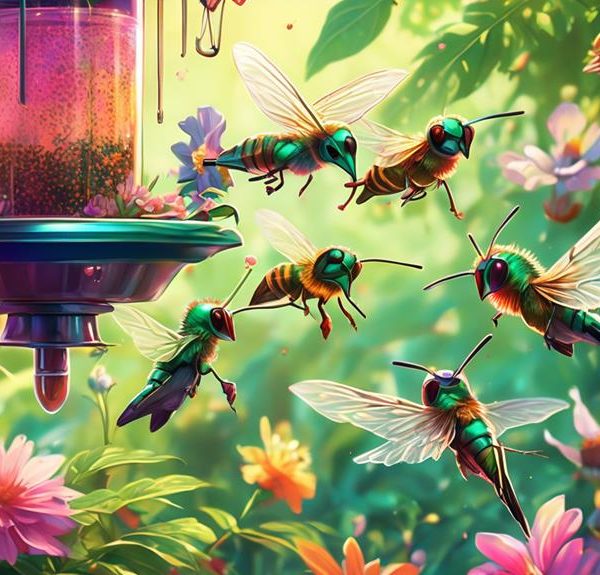Awaken your curiosity and explore the nocturnal mysteries of sweat bees in our intriguing ecological exposé.
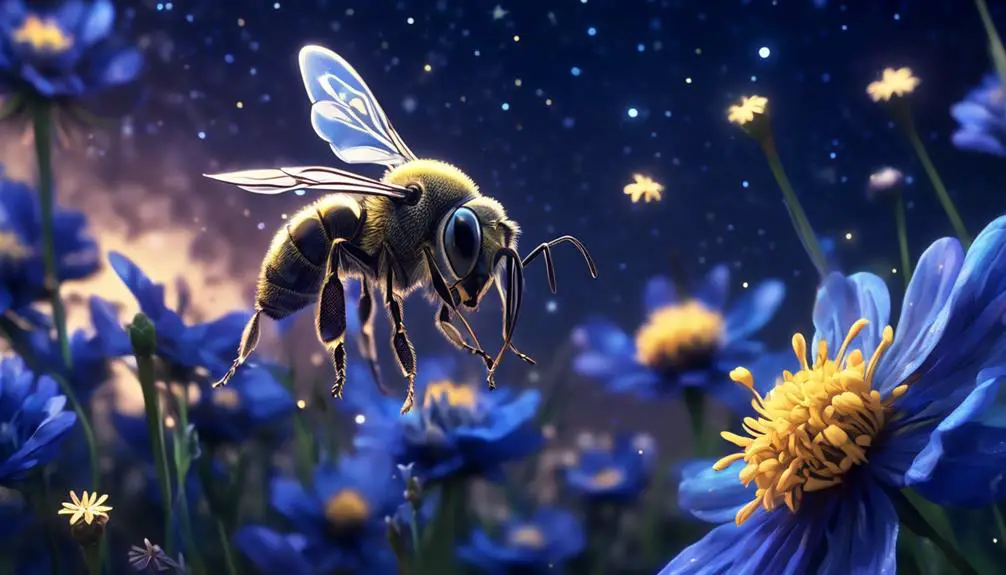
Do Sweat Bees Come Out at Night
Like a detective unravelling a complex mystery, you've found yourself intrigued by the behavior of sweat bees, particularly their nocturnal activities. Are these tiny creatures, commonly active during the day, also buzzing around when the moon takes over the sky?
Sweat bees, despite their minuscule size, play a significant role in our ecosystem. Their habits and lifestyle, believe it or not, can teach us a lot about nature's fascinating intricacies. Stick around as we explore the veiled world of these bees, and you might just uncover something that shakes your understanding of these small but mighty creatures.
Key Takeaways
- Sweat bees are most active during the day, buzzing around flowers for nectar and pollen.
- At night, they retreat to their nests for rest but can emerge if disturbed.
- Sweat bees sleep in plant stems or burrow into the ground, entering a state of torpor with reduced movement and metabolic rate.
- Lack of sleep can affect their ability to collect food and reproduce.
Understanding Sweat Bees' Behavior
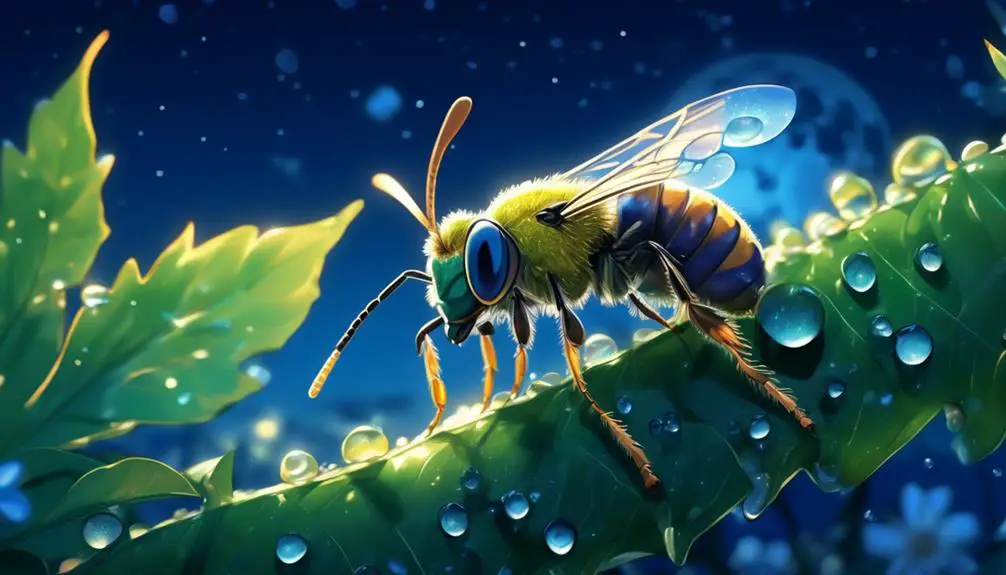
You mightn't know it, but sweat bees have a unique set of behaviors that differ significantly from other bee species. They're not your typical honey bees; they're smaller, less aggressive, and yes, they're attracted to human sweat. It's not because they're creepy; they're just after the salts and electrolytes. Fascinating, isn't it?
Now, you're probably wondering, 'Do sweat bees come out at night?' The answer is, not typically. They're diurnal creatures, meaning they're most active during the day. You'll see them buzzing around flowers, feasting on nectar and pollen, and occasionally taking a pit stop on your sweaty skin. But when the sun sets, they retreat to their nests for some well-deserved rest.
However, don't let this lull you into a false sense of security. While they're less likely to bother you at night, they're not completely inactive. If disturbed, they can and will emerge from their nests. So, it's best to steer clear of their territory after dark.
Nighttime Activities of Sweat Bees

While sweat bees are generally less active at night, it's intriguing to explore what these tiny creatures are up to when the sun goes down. You might be wondering: do these bees sleep? Well, you're in for a surprise! Sweat bees do sleep, but not in the way you or I would.
Here's what you should know about these nocturnal activities:
- Sweat bees don't have eyelids, so they can't close their eyes. Instead, they enter a state of torpor, where their body slows down significantly.
- With their reduced movement and metabolic rate, they're less likely to be spotted by predators.
- They usually tuck themselves in the stems of plants or burrow into the ground for a good night's sleep.
- They don't sleep for a solid 8 hours like we do. They take short naps throughout the day and night.
- Just like us, sweat bees need their rest to function properly. The lack of sleep can affect their ability to collect food and reproduce.
Misconceptions About Sweat Bees
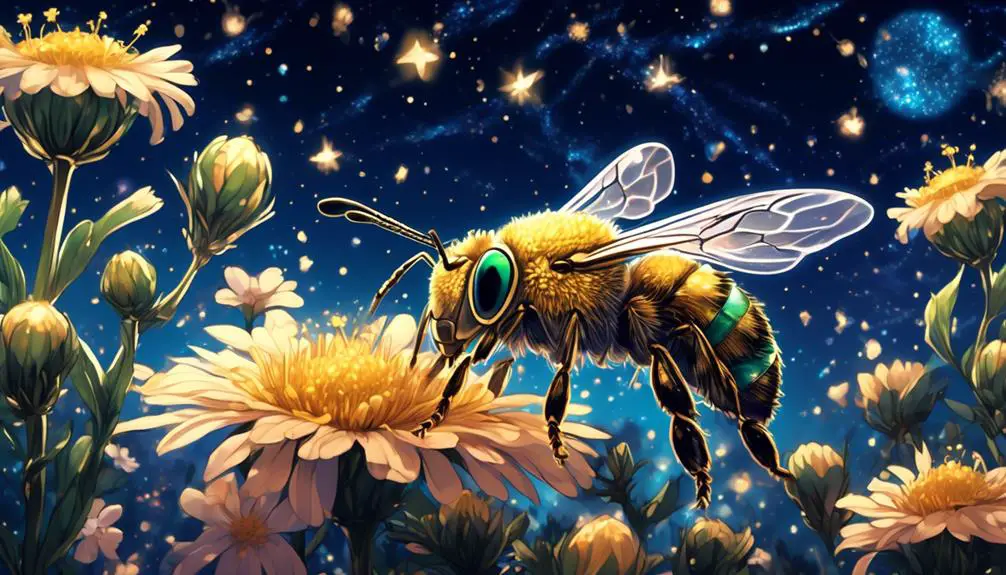
Despite their name, sweat bees aren't attracted to human sweat alone, debunking one of the most common misconceptions about these fascinating insects. Yes, they're drawn to the salts in our sweat, but there's more to their diet. These bees are actually important pollinators, feasting primarily on nectar and pollen from various plants.
Another common misconception is that sweat bees are aggressive pests. In reality, they're generally non-aggressive and will only sting when threatened or handled roughly. And even when they do sting, it's often described as much less painful than a typical bee sting.
You may also wrongly believe that all sweat bees are black. While some species are, others exhibit striking metallic hues, including green, blue, and even bronze. There are literally thousands of sweat bee species, each with its own unique characteristics.
Lastly, don't assume that all sweat bees are nocturnal just because you catch sight of one at dusk. While some species may be more active at night, many are diurnal, buzzing about during the day. Thus, it's essential to avoid generalizations and appreciate the diversity within the sweat bee family.
Sweat Bees' Interaction With Humans
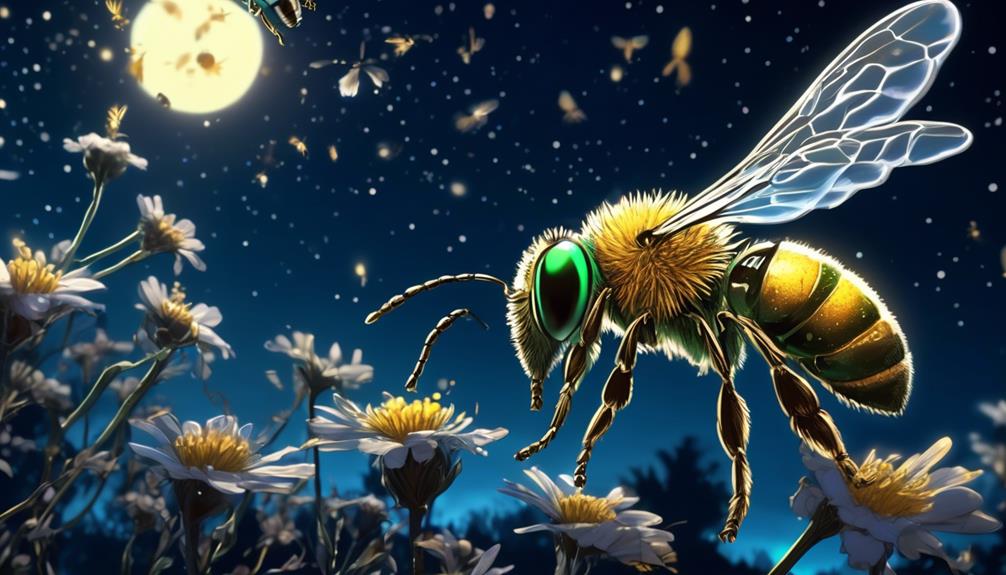
Building on the understanding of sweat bees' behavior, let's now explore how these insects interact with humans. Despite their name, sweat bees aren't as threatening to humans as you might think. They're attracted to human sweat, not because they're out to get you, but because it provides them with salt, a vital nutrient.
Now, you might be wondering what happens when a sweat bee stings. Well, while they can sting, it's usually mild and not as painful as a bee or wasp sting. Moreover, they're not aggressive and will only sting when threatened or squished.
Here are some points to remember:
- Sweat bees are attracted to human sweat because it provides them with necessary salt.
- They can sting, but it's usually mild and less painful than other bee stings.
- Sweat bees aren't aggressive and will only sting when threatened.
- If you stay calm and avoid swatting at them, they're unlikely to sting.
- They're beneficial for the environment as they pollinate a variety of plants.
Unraveling Sweat Bees' Nocturnal Mystery
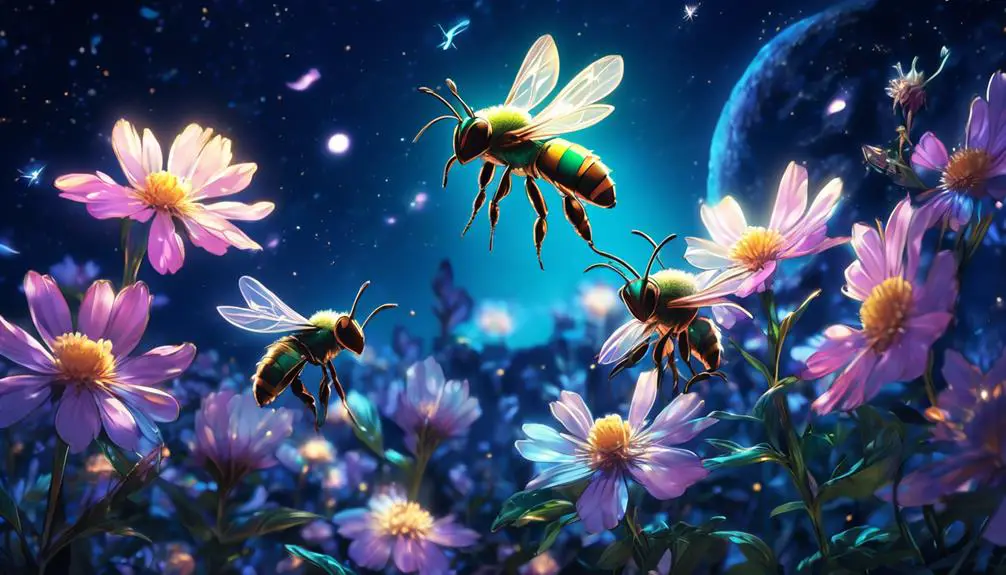
You might be surprised to learn that many species of sweat bees have adapted to a nocturnal lifestyle, a mystery that has intrigued entomologists for years. Contrary to popular belief, these tiny insects aren't just daytime foragers. They've evolved into night owls, pollinating flowers under the cover of darkness.
This change in behavior allows sweat bees to avoid predators and the scorching heat of the day. But it's not just about survival. These creatures play a vital role in pollination at night when most other bees are inactive. If you've ever wondered why some flowers bloom brilliantly in the morning, you can thank the nocturnal sweat bees for their midnight pollination.
Intriguingly, these bees have specialized adaptations for their night shift. For instance, they've larger, more sensitive eyes to help them see in low light. They've also developed a keen sense of smell, picking up on the scent of flowers that bloom only at night.
Conclusion
So, you've discovered that sweat bees do come out at night, busting a common misconception. They're drawn to your sweat, but aren't typically aggressive.
It's still a bit of a mystery why they're nocturnal, but their nighttime activities are just part of their unique behavior.
Now that you understand these tiny creatures better, you can coexist peacefully, knowing they're just doing their part in the ecosystem.

